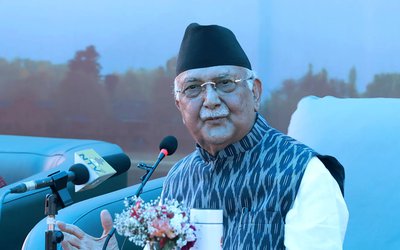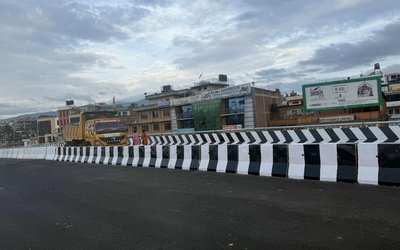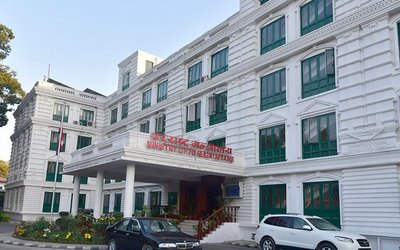More on News





In 1961, it took Barbara Adams more than a week to arrive in Nepal from the United States of America. Green paddy fields, mountains and a lovely town welcomed her in Kathmandu. Today, five million people mill around the chaotic city.
When she came, an autocratic Panchayat system ran the nation’s state of affairs under an absolute monarchy. Over the tumultuous decades, she saw constitutional monarchy under a multi-party democracy, promulgation of the new interim constitution, historic elections to the Constituent Assembly and then the abolition of monarchy. Barbara has published her memoire in which she describes the turmoil and changes taking place in Nepal.
Call her a living history of Nepal’s change, if you will, Barabara, however, is a bit frustrated about political leaders and the old generation. But she has not given up hope for a better Nepal.
“It’s only the young people who give me hope for a newer, better Nepal,” said Barbara Adams.
Barbara always had a penchant for peculiar experiences. Growing up in the shadows of the Cold War, Barbara joined a group of girls, who were trained to ride horses and rescue people out of Washington DC on horsebacks, in case the Third World War broke. Her experience with the horses led her to quit school and spend time in the stables. She was a bona-fide rebel by the age of 12.
In 1961, Queen Elizabeth II was due to arrive in Nepal. Barbara, an aspiring journalist, was commissioned by an Italian magazine to cover the queen’s maiden Nepal visit. By the time Barbara arrived in Kathmandu from Kolkata, her subject was gone. The 20-something amateur was immediately mesmerized by the mountains. Her mother later described them as “big ice-cream cones floating in the sky.” The shy girl, who was born in Manhattan, NY, soon found herself utterly at home in Nepal.
After more than four decades, Barbara was granted Nepali citizenship in 2009. In her nearly 50 years of experience in Nepal, Barbara has seen her beloved country transform from relative obscurity into a state that could best be described as relative ‘chaos.’ She has seen political upheavals, regime changes, and socio-cultural transformation. As someonuse, who was once very close to the royal family, and the international community, she has exciting anecdotes to share with the readers.
Barbara On Kathmandu Then and Now
Kathmandu has become ugly. Its growth has gone out of control. We used to have a lovely view of the green hills and the snow-mountains. Huge, ugly billboards and even uglier buildings that have no rhyme or reason where they are placed have blocked the view. Kathmandu is a garbage ridden disaster right now.
Kathmandu was a small beautiful village; something untouched or unspoiled by western or foreign world. Everything was clean; there was hardly any trash because there was nothing to buy. Every day, you could see the mountains because there was no pollution. There were a few brick houses, the Rana palaces, the green hills and the mountains. It really deserved the name Shangri-La.
Sure, there have been some positive political changes, but visually, Kathmandu has become a disaster.
Observations on Class/Caste Divide
There was clearly an aristocracy class (in the bygone days), which was not too interested in villages or ordinary people. But people were also less aware then. Oddly enough, things were less stratified back then. Now everything is divided and politicized. The house, where I used to live, we had people from different backgrounds and I ate more variety of food than what I eat now.
Nowadays people either drive their Pajeros/ Prados or they walk. Back then people walked or had bicycles. Walking and bicycling, you could communicate. So ministers communicated with their constituents and ordinary people communicated much more easily.
There is a much bigger gap between the rich and poor now than there was in those days. Now, money divides people. Back then, there was less division. Although the first people I met were mostly Ranas and Shahs, in a way, society seemed more egalitarian.
On Changing Social Attitudes
People were innocent back then. Instead of being suspicious, people readily chatted on the streets. They were very honest and very straight. I remember leaving my wallet with all my money and two days later somebody brought it back to my house.
I blame too much foreign presence and too much money being thrown too fast in Nepal for corruption and greed. Greed and corruption have become our culture.
On TV, you see appalling ads with half naked women, drinking, violence, stuff that I did not like in America. No wonder moral values of people are down. I don’t think Nepal is ready for all that until the whole country is educated and ready for it. It wasn’t like that in Nepal when I got here. Nepal is adopting the worst thing from the west.
On a Positive Note
Good things have come, like in the consciousness of people about their rights. In the Panchayat times, things were hidden, people could be thrown in jail for breaking the secrecy but now things are much more in the open, which is good.
Youth of Nepal is creative. The films that are being produced (by youth) are impressive for a country that was once so closed. There are films on animal sacrifice and third gender. It‘s only the young people who give me hope for a newer, better Nepal. They need to sink their teeth in and do what is needed to be done.







